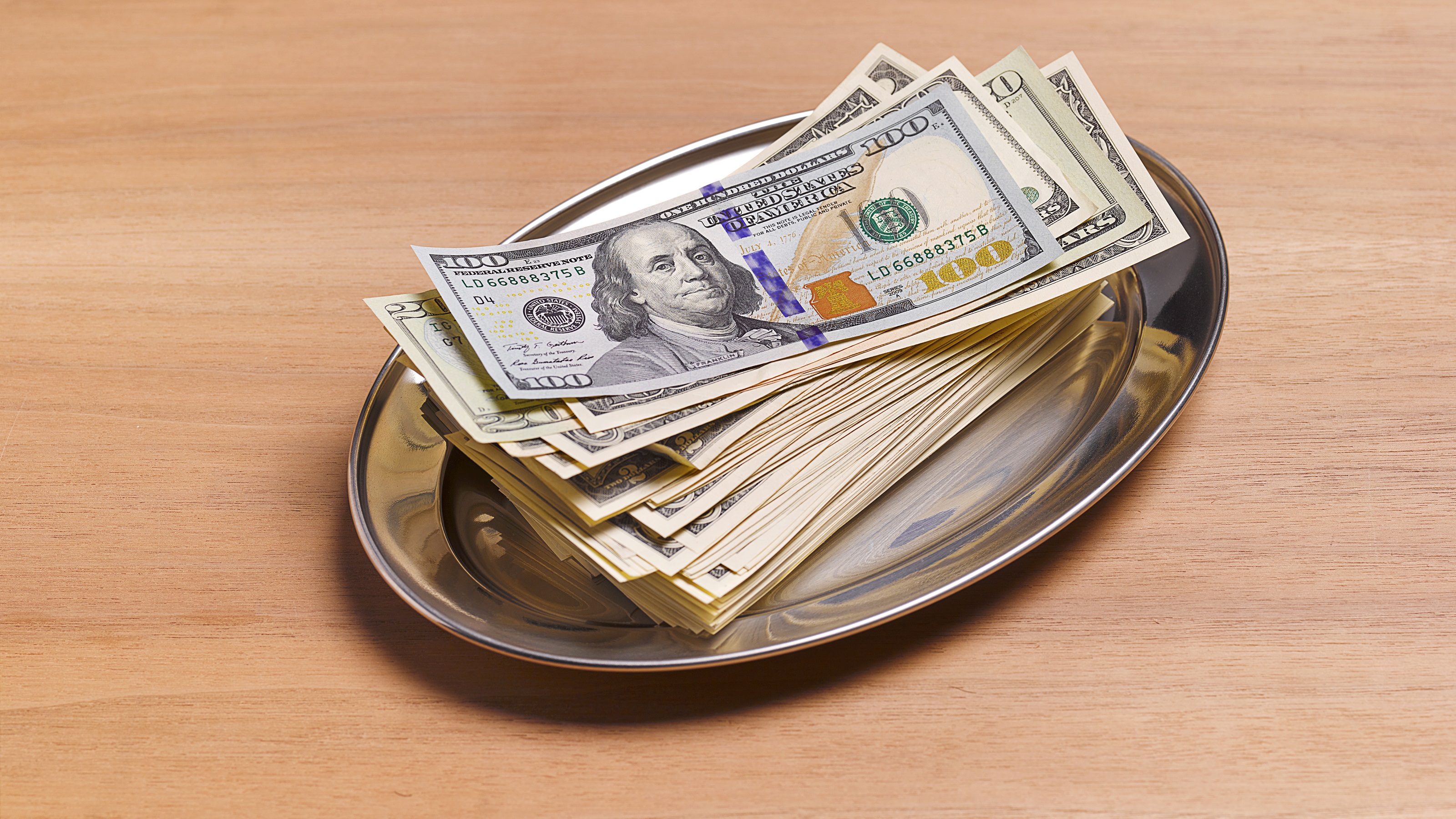When Deciding Where to Put Idle Cash, Consider These Three Factors
While interest rates remain high, you can put idle cash to work, but be sure to look at the rate of return, security and liquidity of your options.


Profit and prosper with the best of Kiplinger's advice on investing, taxes, retirement, personal finance and much more. Delivered daily. Enter your email in the box and click Sign Me Up.
You are now subscribed
Your newsletter sign-up was successful
Want to add more newsletters?

Delivered daily
Kiplinger Today
Profit and prosper with the best of Kiplinger's advice on investing, taxes, retirement, personal finance and much more delivered daily. Smart money moves start here.

Sent five days a week
Kiplinger A Step Ahead
Get practical help to make better financial decisions in your everyday life, from spending to savings on top deals.

Delivered daily
Kiplinger Closing Bell
Get today's biggest financial and investing headlines delivered to your inbox every day the U.S. stock market is open.

Sent twice a week
Kiplinger Adviser Intel
Financial pros across the country share best practices and fresh tactics to preserve and grow your wealth.

Delivered weekly
Kiplinger Tax Tips
Trim your federal and state tax bills with practical tax-planning and tax-cutting strategies.

Sent twice a week
Kiplinger Retirement Tips
Your twice-a-week guide to planning and enjoying a financially secure and richly rewarding retirement

Sent bimonthly.
Kiplinger Adviser Angle
Insights for advisers, wealth managers and other financial professionals.

Sent twice a week
Kiplinger Investing Weekly
Your twice-a-week roundup of promising stocks, funds, companies and industries you should consider, ones you should avoid, and why.

Sent weekly for six weeks
Kiplinger Invest for Retirement
Your step-by-step six-part series on how to invest for retirement, from devising a successful strategy to exactly which investments to choose.
After the Fed raised interest rates to their highest level in years, many forecasts predicted that we would see rate cuts once inflation cooled off. That hasn’t happened.
The federal funds rate remains between 5.25% and 5.50%, and those long-anticipated cuts continue to be pushed back. This has left investors with important decisions about how to best manage their savings during an extended period of higher rates.
Those savings are substantial. In 2022, the median American household held $8,000 in cash in transaction accounts (regular checking or savings). A modest figure by some measures, but consider that the mean household held $62,000 in transaction accounts during that same calendar year. For households with individuals age 65 to 74, the amount was over $100,000.
From just $107.88 $24.99 for Kiplinger Personal Finance
Become a smarter, better informed investor. Subscribe from just $107.88 $24.99, plus get up to 4 Special Issues

Sign up for Kiplinger’s Free Newsletters
Profit and prosper with the best of expert advice on investing, taxes, retirement, personal finance and more - straight to your e-mail.
Profit and prosper with the best of expert advice - straight to your e-mail.
Savers holding this cash in traditional savings accounts are seeing minimal returns; as of May 2024, the average savings account is paying 0.45% interest, according to the FDIC. In fact, with inflation still hovering above 3%, the value of such accounts is actually falling in relative terms.
What are the alternatives?
Assessing alternatives to savings accounts
Last year, I wrote about five places to put cash outside of a normal bank account. In this high-rate environment, savers continue to have a unique opportunity to maximize their cash holdings. There is a range of options to choose from: brokerage accounts, money market mutual funds (MMMFs), certificates of deposit (CDs) and Treasury bills, to name a few.
When deciding where to hold cash, investors should consider three key factors: rate of return, security and liquidity. Here’s a closer look at each:
Rate of return. One important question investors should ask is: What kind of return will I see on my money? The baseline goal should be to protect the value of cash by finding yields that keep up with inflation. With higher interest rates, those opportunities are ample, and many options even outpace inflation.
Security. Investors also want to ensure their cash is secure. The FDIC insures standard savings accounts up to $250,000 in the event of a bank failure. Bank failures are rare, but as we saw last year, higher interest rates and other macroeconomic factors put additional financial pressure on balance sheets, leading to a number of notable collapses.
The tradeoff for balance protection in a savings account is typically lower yields. Meanwhile, popular higher-yield options, such as money market mutual funds (MMMFs) or Treasury bills, are not FDIC-protected.
However, there are ways to earn higher returns without sacrificing peace of mind; high-yield brokerage accounts can offer competitive interest rates and provide access to FDIC insurance. Some brokerages also provide access to FDIC insurance beyond the standard $250,000 limit by working with partner banks to layer protections.
Liquidity. Finally, how available is the cash when it needs to be accessed? Some high-yield savings options also limit the number of withdrawals you can make in a month. An investor who buys Treasury bills, for instance, must wait for them to mature before the funds become available, or sell them in the secondary market, introducing risk to the principal.
Cash invested in money market mutual funds is far more liquid, but there is still a settlement period. It can take two business days to transfer funds to a bank account. In an emergency, that might be longer than someone is willing to wait. Certain money market funds also have what’s called a liquidity gate, which allows the fund manager to prevent large outflows — potentially locking up cash when it’s needed most.
High-yield brokerage accounts, on the other hand, can offer same-day transfers. Savers concerned about liquidity may sleep better with cash more immediately accessible.
Navigating elevated interest rates
Understanding how to make the most of cash is especially important given the latest interest rate projections. Investors should prepare for a “higher for longer” environment where interest rates remain elevated moving forward. According to the CME FedWatch Tool, which calculates probabilities of rate changes, the most likely outcome is one to two rate cuts in the next year.
With deeper cuts unlikely for some time, savvy investors will take advantage of these higher rates to preserve and grow their savings. As they do so, rate of return, security and liquidity should remain top of mind when managing cash holdings.
Related Content
- How Much Cash You Really Need
- Five Places to Put Cash Rather Than in the Bank
- When It Comes to Cash Yields, Cash Is No Longer Trash
- Are You a Baby Boomer With Too Much Cash? Three Scenarios for What to Do
- Personalized Investing Portfolios: Unlock the Greatest Potential
Profit and prosper with the best of Kiplinger's advice on investing, taxes, retirement, personal finance and much more. Delivered daily. Enter your email in the box and click Sign Me Up.

Adam Grealish serves as Head of Investments at Altruist, a fintech company on a mission to make great independent financial advice more affordable and accessible. With a career rooted in financial innovation, Adam most recently led Betterment's strategic asset allocation, fund selection, automated portfolio management, and tax strategies. In addition, he served as a vice president at Goldman Sachs, overseeing the structured corporate credit and macro credit trading strategies.
-
 Nasdaq Leads a Rocky Risk-On Rally: Stock Market Today
Nasdaq Leads a Rocky Risk-On Rally: Stock Market TodayAnother worrying bout of late-session weakness couldn't take down the main equity indexes on Wednesday.
-
 Quiz: Do You Know How to Avoid the "Medigap Trap?"
Quiz: Do You Know How to Avoid the "Medigap Trap?"Quiz Test your basic knowledge of the "Medigap Trap" in our quick quiz.
-
 5 Top Tax-Efficient Mutual Funds for Smarter Investing
5 Top Tax-Efficient Mutual Funds for Smarter InvestingMutual funds are many things, but "tax-friendly" usually isn't one of them. These are the exceptions.
-
 Social Security Break-Even Math Is Helpful, But Don't Let It Dictate When You'll File
Social Security Break-Even Math Is Helpful, But Don't Let It Dictate When You'll FileYour Social Security break-even age tells you how long you'd need to live for delaying to pay off, but shouldn't be the sole basis for deciding when to claim.
-
 I'm an Opportunity Zone Pro: This Is How to Deliver Roth-Like Tax-Free Growth (Without Contribution Limits)
I'm an Opportunity Zone Pro: This Is How to Deliver Roth-Like Tax-Free Growth (Without Contribution Limits)Investors who combine Roth IRAs, the gold standard of tax-free savings, with qualified opportunity funds could enjoy decades of tax-free growth.
-
 One of the Most Powerful Wealth-Building Moves a Woman Can Make: A Midcareer Pivot
One of the Most Powerful Wealth-Building Moves a Woman Can Make: A Midcareer PivotIf it feels like you can't sustain what you're doing for the next 20 years, it's time for an honest look at what's draining you and what energizes you.
-
 I'm a Wealth Adviser Obsessed With Mahjong: Here Are 8 Ways It Can Teach Us How to Manage Our Money
I'm a Wealth Adviser Obsessed With Mahjong: Here Are 8 Ways It Can Teach Us How to Manage Our MoneyThis increasingly popular Chinese game can teach us not only how to help manage our money but also how important it is to connect with other people.
-
 Looking for a Financial Book That Won't Put Your Young Adult to Sleep? This One Makes 'Cents'
Looking for a Financial Book That Won't Put Your Young Adult to Sleep? This One Makes 'Cents'"Wealth Your Way" by Cosmo DeStefano offers a highly accessible guide for young adults and their parents on building wealth through simple, consistent habits.
-
 Global Uncertainty Has Investors Running Scared: This Is How Advisers Can Reassure Them
Global Uncertainty Has Investors Running Scared: This Is How Advisers Can Reassure ThemHow can advisers reassure clients nervous about their plans in an increasingly complex and rapidly changing world? This conversational framework provides the key.
-
 I'm a Real Estate Investing Pro: This Is How to Use 1031 Exchanges to Scale Up Your Real Estate Empire
I'm a Real Estate Investing Pro: This Is How to Use 1031 Exchanges to Scale Up Your Real Estate EmpireSmall rental properties can be excellent investments, but you can use 1031 exchanges to transition to commercial real estate for bigger wealth-building.
-
 Should You Jump on the Roth Conversion Bandwagon? A Financial Adviser Weighs In
Should You Jump on the Roth Conversion Bandwagon? A Financial Adviser Weighs InRoth conversions are all the rage, but what works well for one household can cause financial strain for another. This is what you should consider before moving ahead.